青少版新概念英语2A-Unit 11 We all have our troubles 课件(共50张PPT,无素材)
文档属性
| 名称 | 青少版新概念英语2A-Unit 11 We all have our troubles 课件(共50张PPT,无素材) |
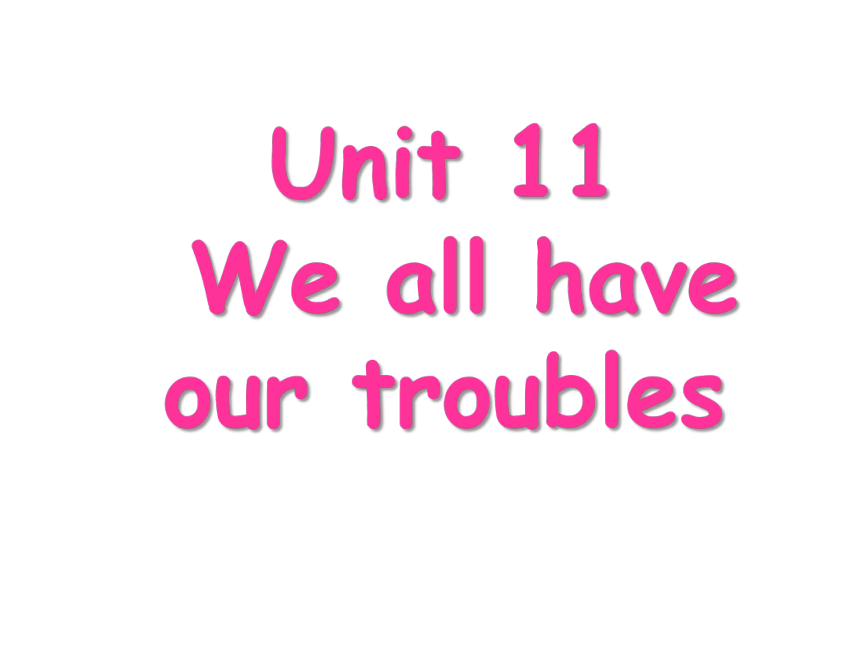
|
|
| 格式 | ppt | ||
| 文件大小 | 5.8MB | ||
| 资源类型 | 教案 | ||
| 版本资源 | 新概念英语 | ||
| 科目 | 英语 | ||
| 更新时间 | 2023-10-09 11:00:19 | ||
图片预览

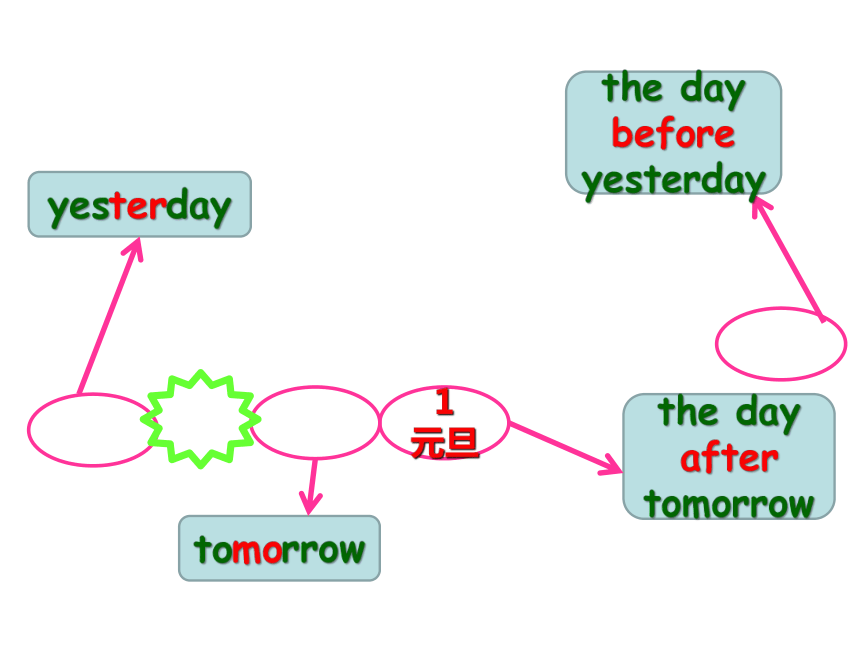


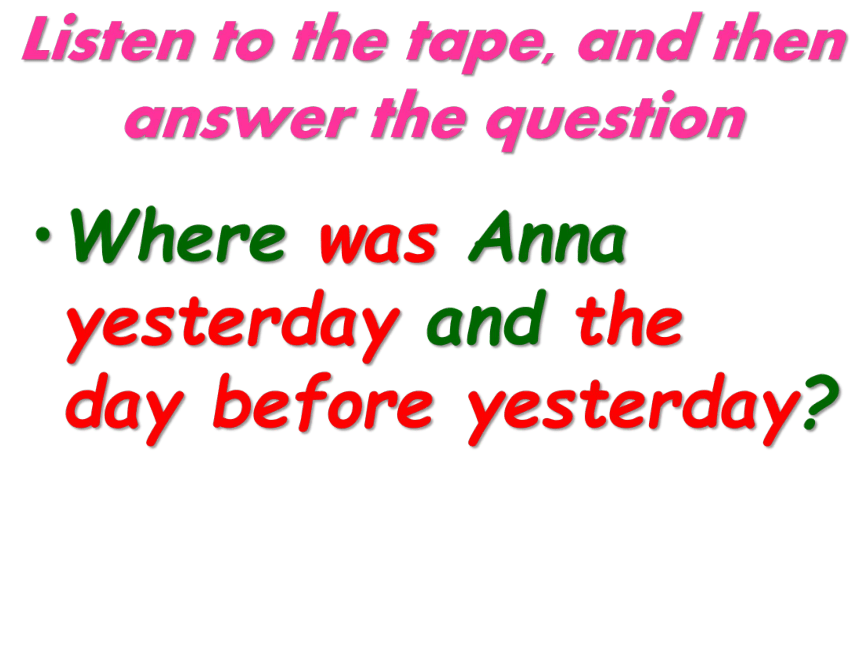
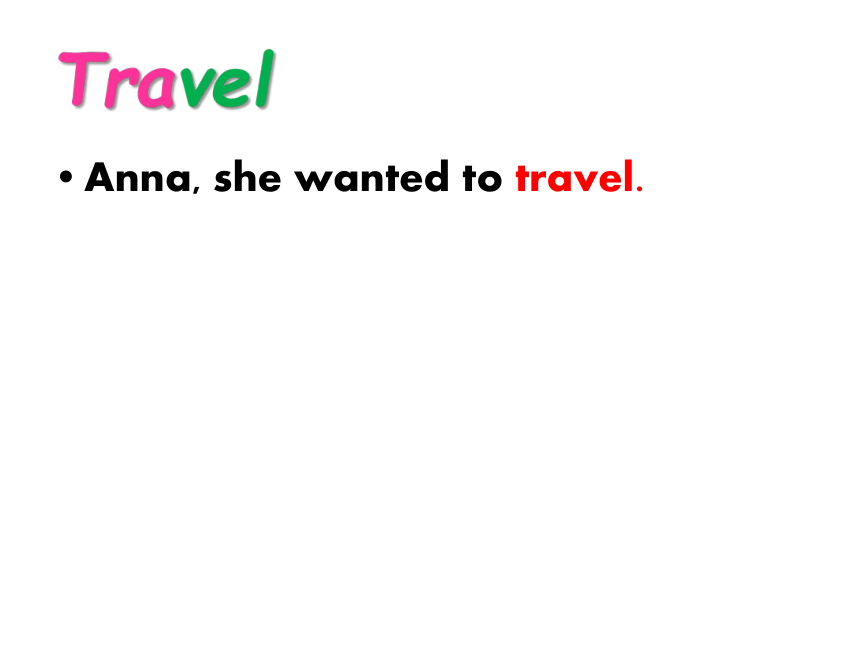


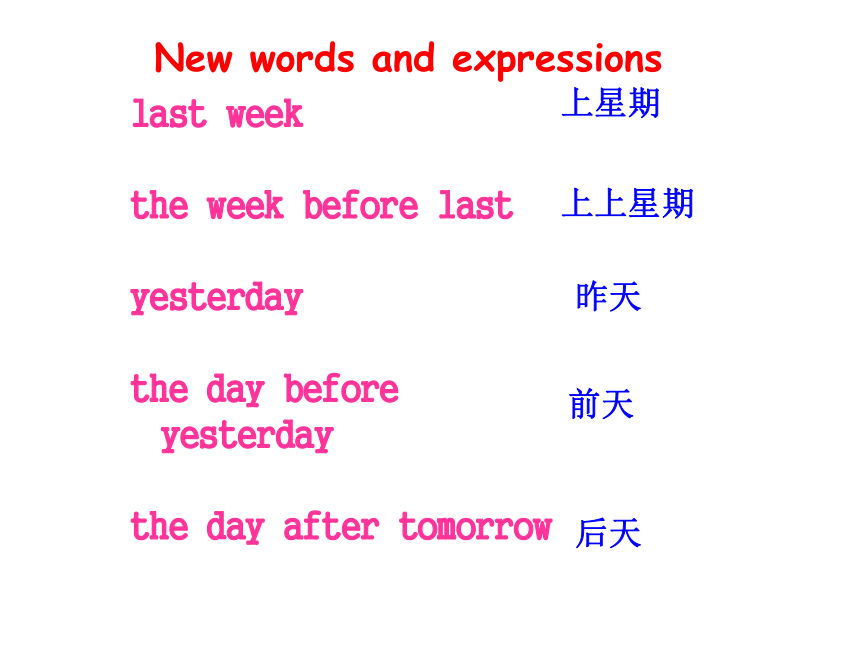
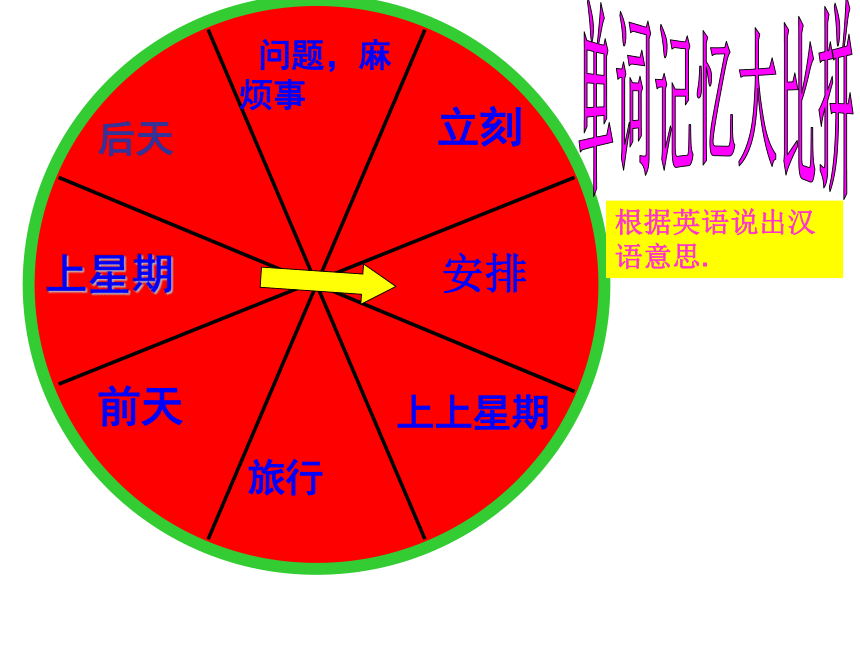
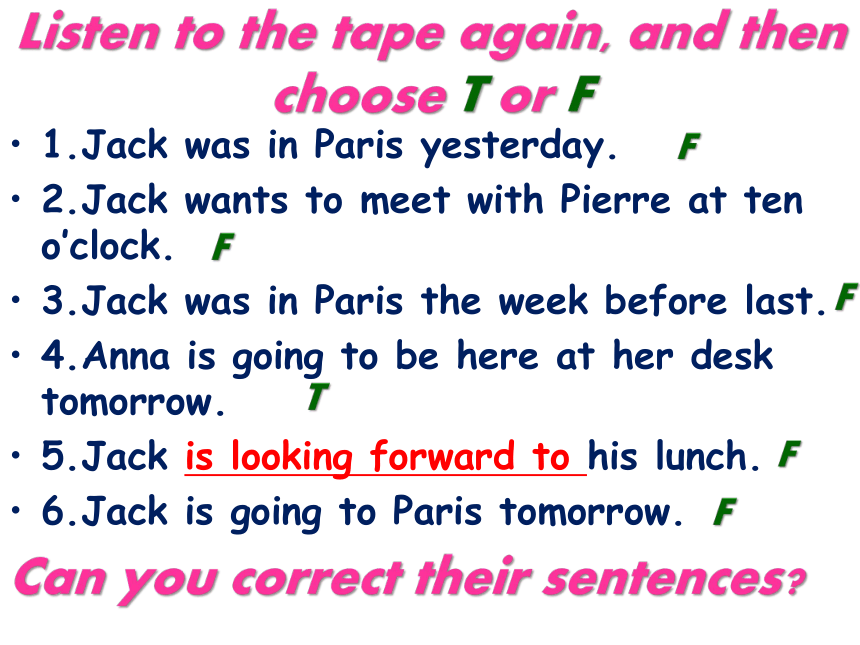
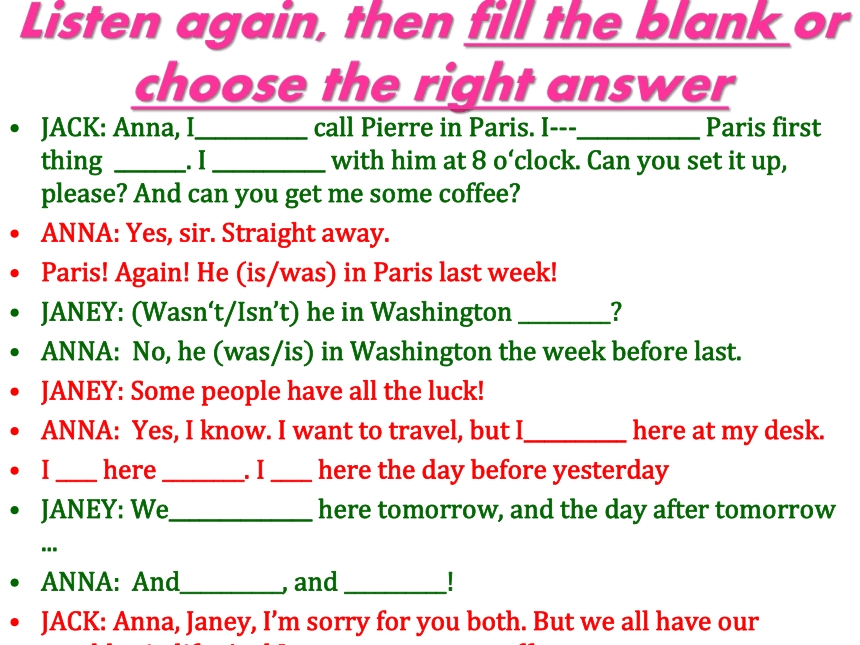
文档简介
(共50张PPT)
Unit 11
We all have our troubles
1
元旦
the day
before
yesterday
yesterday
tomorrow
the day
after
tomorrow
We all have our troubles
Listen to the tape, and then answer the question
Where was Anna yesterday and the day before yesterday
Travel
Anna, she wanted to travel.
set up
straight away
=plan
=right now =at once
New words and expressions
trouble
set up
sir
straight away
travel
安排
先生
adv. 立刻
V. 旅行
n. 问题,麻烦事
New words and expressions
last week
the week before last
yesterday
the day before yesterday
the day after tomorrow
上上星期
昨天
前天
后天
上星期
上星期
问题,麻烦事
后天
立刻
前天
旅行
安排
上上星期
根据英语说出汉语意思.
Listen to the tape again, and then choose T or F
1.Jack was in Paris yesterday.
2.Jack wants to meet with Pierre at ten o’clock.
3.Jack was in Paris the week before last.
4.Anna is going to be here at her desk tomorrow.
5.Jack is looking forward to his lunch.
6.Jack is going to Paris tomorrow.
Can you correct their sentences
F
F
F
T
F
F
Listen again, then fill the blank or choose the right answer
JACK: Anna, I___________ call Pierre in Paris. I ____________ Paris first thing _______. I ___________ with him at 8 o‘clock. Can you set it up, please And can you get me some coffee
ANNA: Yes, sir. Straight away.
Paris! Again! He (is/was) in Paris last week!
JANEY: (Wasn‘t/Isn’t) he in Washington _________
ANNA: No, he (was/is) in Washington the week before last.
JANEY: Some people have all the luck!
ANNA: Yes, I know. I want to travel, but I__________ here at my desk.
I ____ here ________. I ____ here the day before yesterday
JANEY: We______________ here tomorrow, and the day after tomorrow ...
ANNA: And__________, and __________!
JACK: Anna, Janey, I’m sorry for you both. But we all have our troubles in life. And I_______________ my coffee.
Language points
JACK: Anna, I want you to call Pierre in Paris. I’m going to Paris first thing (一大早) tomorrow.
I want to meet with him at 8 o‘clock. Can you set it up (安排它), please And can you get me some coffee
ANNA: Yes, sir. Straight away (马上at once). Paris! Again! He was in Paris last week! JANEY: Wasn‘t he in Washington last week ANNA: No, he was in Washington the week before last (上上星期).
JANEY: Some people have all the luck (真幸运) !
ANNA: Yes, I know. I want to travel, but I'm always here at my desk.
I was here yesterday. I was here the day before yesterday (前天).
JANEY: We‘re going to be here tomorrow, and the day after tomorrow (后天)...
ANNA: And next week, and next month!
JACK: Anna, Janey, I’m sorry for (为…感到难过,歉疚)you both. But we all have our troubles in life. And I’m looking forward to (期望,盼望) my coffee.
Comprehension questions
What does Jack want Anna to do
Where’s Jack going first thing tomorrow
What does he want Anna to get him
Where was he last week
Where was he the week before last
What does Anna want to do
When are Anna and Janey going to be at their desks
What’s Jack looking forward to
Have a break~~~
New words and expressions
traffic jam 交通堵塞
I am in a traffic jam. 我遇上了…
traffic light 红绿灯
class (一节)课
have English classes
meeting 会议=conference
parents' meeting
hospital 医院
in hospital 在住院 in the hospital在医院里
Party 聚会
kind 亲切的
A: Was Robert at school yesterday?
B: No, he wasn’t.
A: was he at home
B: Yes, he was.
A: Were you at school yesterday?
B: No, I wasn’t.
A: Where were you
B: I was at home.
A: Was Robert at school yesterday
B: No, he wasn’t at school yesterday. He was at home.
A: Were you at school yesterday
B: No, I wasn’t at school yesterday. I was at home.
A: Robert was at home yesterday.
B: Where was he
A: At home.
B: When was that
A: Yesterday.
Was he/she ********
Yes ,he/she was. No ,he/she wasn`t.
Were you /they ******
Yes ,they were. No ,they weren`t.
Polly / in town
(at home)
yesterday morning
Anna / at her desk.
(at the shops)
yesterday afternoon
William / in a traffic jam.
(in the office )
yesterday evening.
Lucy / in bed
(in class)
last night
Annie / in town ,
(in the country)
the day before yesterday
Karen / at a meeting
(at home)
the night before last
Mr .Ford / in hospital
(at work)
lask week
一般过去时态的定义
动词的一般过去时态表示过去发生的动作、情况或存在的状态。行为动词(即实义动词)的过去式没有人称和数的变化。
1.与ago之前 连用:
a moment
two minutes
three hours
five days
one week
six months
four years
ago
用于一般过去时的时间状语
last
time
night
week
month
term
Monday
yesterday
morning
afternoon
evening
the day before yesterday
2.与last 连用
3.与yesterday 连用:
4.与one 连用:
one
morning
evening
day
Monday afternoon
5.与that 连用:
that
morning
winter
day
year
I ___ 12 years old this year.
我去年11岁.
I ____ 11 years old last year.
He ____ in Beijing now.
他昨天在上海。
He ____ in Shanghai yesterday.
他现在在北京。
Please look at the sentences
我今年12岁.
am
was
is
was
They ____ in China today.
他们今天在中国。
They ____ in Japan yesterday.
他们昨天在日本。
are
were
am/ is
was
are
were
每天,早餐我吃鸡蛋和牛奶。
I ____ eggs and milk for breakfast every morning.
昨天,早餐我吃面条。
I ____ noodles for breakfast yesterday morning.
他每天都吃水果。
He _____ fruit every day.
昨天他吃了3个苹果。
He _____ 3 apples yesterday.
have/ has
had
have
has
had
had
I get up at 6:30 every morning.
I ___ up at 9:00 last Sunday.
He plays football every afternoon.
He _____ basketball yesterday afternoon.
He does his homework every evening.
He ____ his homework last night.
动词原形、第三人称单数
动词过去式
got
played
did
They don’t watch TV in the evening.
They _________ TV last night.
She doesn’t play basketball after school.
She _________ basketball after school yesterday.
Do you go to school on foot every day
___ you __ to school on foot yesterday.
Does he go to school by bus every day
___ he ___to school by bus yesterday
don’t/ doesn’t
do/ does
didn’t
did
didn’t watch
didn’t play
Did
Did
go
go
规则动词过去式的构成
1.一般动词原形末尾加-ed。如:look→looked, stay→stayed ;
2.以e结尾的动词只加-d。如:hope→hoped, live→lived;
3.末尾为”辅音+元音+辅音”的重读闭音节的动词,应先双写这个辅音字母,再加-ed.如:stop→stopped, plan(计划) →planned;
4.结尾是“辅音字母+y”的动词,先将y改为i,再加-ed. 如:study→studied, carry→carried.
谓语构成
1.动词 be
2.动词 have, has
3.助动词do, does
4.行为动词用过去式
was , were
had
did
一般过去时以动词的过去式来表示,没有人称和数的变化.(was,were除外)
I went to school yesterday.
They went to school yesterday.
行为动词一般过去时的否定式
一般过去时的否定式是在动词原形前加助动词did not (didn’t).
主语+didn’t+动词原形
I _________ them the news.
I ____ (tell) them the news yesterday.
didn’t tell
told
行为动词一般过去时的疑问式
一般过去时的一般疑问式在句首加助动词did
Did+主语+动词原形……?
They ______(finish) their work at four.
一般疑问句:
____ they _____ their work at four
Yes, they _____. No, they _____.
finished
Did
finish
did
didn’t
行为动词一般过去时的疑问式
一般过去时的特殊疑问式
疑问词+did+主语+动词原形……?
They finished their work at four.
A
B
对划线部分提问
A:
B:
What did they do at four
When did they finish their work
T
注意
1.外加助动词did后,动词须返回原形。
Did he went to school yesterday
Did he go to school yesterday
F
2.简略回答用助动词did/didn’t代替行为动词。
Did he find the boy yesterday
-Yes, he did.
-No, he did not (didn’t).
原形 过去式 原形 过去式
are were am/is was
have/ has had do did
go went come came
eat ate say said
see saw take took
buy bought make made
sing sang hear heard
find found break broke
think thought fall fell
write wrote put put
read read
Unit 11
We all have our troubles
1
元旦
the day
before
yesterday
yesterday
tomorrow
the day
after
tomorrow
We all have our troubles
Listen to the tape, and then answer the question
Where was Anna yesterday and the day before yesterday
Travel
Anna, she wanted to travel.
set up
straight away
=plan
=right now =at once
New words and expressions
trouble
set up
sir
straight away
travel
安排
先生
adv. 立刻
V. 旅行
n. 问题,麻烦事
New words and expressions
last week
the week before last
yesterday
the day before yesterday
the day after tomorrow
上上星期
昨天
前天
后天
上星期
上星期
问题,麻烦事
后天
立刻
前天
旅行
安排
上上星期
根据英语说出汉语意思.
Listen to the tape again, and then choose T or F
1.Jack was in Paris yesterday.
2.Jack wants to meet with Pierre at ten o’clock.
3.Jack was in Paris the week before last.
4.Anna is going to be here at her desk tomorrow.
5.Jack is looking forward to his lunch.
6.Jack is going to Paris tomorrow.
Can you correct their sentences
F
F
F
T
F
F
Listen again, then fill the blank or choose the right answer
JACK: Anna, I___________ call Pierre in Paris. I ____________ Paris first thing _______. I ___________ with him at 8 o‘clock. Can you set it up, please And can you get me some coffee
ANNA: Yes, sir. Straight away.
Paris! Again! He (is/was) in Paris last week!
JANEY: (Wasn‘t/Isn’t) he in Washington _________
ANNA: No, he (was/is) in Washington the week before last.
JANEY: Some people have all the luck!
ANNA: Yes, I know. I want to travel, but I__________ here at my desk.
I ____ here ________. I ____ here the day before yesterday
JANEY: We______________ here tomorrow, and the day after tomorrow ...
ANNA: And__________, and __________!
JACK: Anna, Janey, I’m sorry for you both. But we all have our troubles in life. And I_______________ my coffee.
Language points
JACK: Anna, I want you to call Pierre in Paris. I’m going to Paris first thing (一大早) tomorrow.
I want to meet with him at 8 o‘clock. Can you set it up (安排它), please And can you get me some coffee
ANNA: Yes, sir. Straight away (马上at once). Paris! Again! He was in Paris last week! JANEY: Wasn‘t he in Washington last week ANNA: No, he was in Washington the week before last (上上星期).
JANEY: Some people have all the luck (真幸运) !
ANNA: Yes, I know. I want to travel, but I'm always here at my desk.
I was here yesterday. I was here the day before yesterday (前天).
JANEY: We‘re going to be here tomorrow, and the day after tomorrow (后天)...
ANNA: And next week, and next month!
JACK: Anna, Janey, I’m sorry for (为…感到难过,歉疚)you both. But we all have our troubles in life. And I’m looking forward to (期望,盼望) my coffee.
Comprehension questions
What does Jack want Anna to do
Where’s Jack going first thing tomorrow
What does he want Anna to get him
Where was he last week
Where was he the week before last
What does Anna want to do
When are Anna and Janey going to be at their desks
What’s Jack looking forward to
Have a break~~~
New words and expressions
traffic jam 交通堵塞
I am in a traffic jam. 我遇上了…
traffic light 红绿灯
class (一节)课
have English classes
meeting 会议=conference
parents' meeting
hospital 医院
in hospital 在住院 in the hospital在医院里
Party 聚会
kind 亲切的
A: Was Robert at school yesterday?
B: No, he wasn’t.
A: was he at home
B: Yes, he was.
A: Were you at school yesterday?
B: No, I wasn’t.
A: Where were you
B: I was at home.
A: Was Robert at school yesterday
B: No, he wasn’t at school yesterday. He was at home.
A: Were you at school yesterday
B: No, I wasn’t at school yesterday. I was at home.
A: Robert was at home yesterday.
B: Where was he
A: At home.
B: When was that
A: Yesterday.
Was he/she ********
Yes ,he/she was. No ,he/she wasn`t.
Were you /they ******
Yes ,they were. No ,they weren`t.
Polly / in town
(at home)
yesterday morning
Anna / at her desk.
(at the shops)
yesterday afternoon
William / in a traffic jam.
(in the office )
yesterday evening.
Lucy / in bed
(in class)
last night
Annie / in town ,
(in the country)
the day before yesterday
Karen / at a meeting
(at home)
the night before last
Mr .Ford / in hospital
(at work)
lask week
一般过去时态的定义
动词的一般过去时态表示过去发生的动作、情况或存在的状态。行为动词(即实义动词)的过去式没有人称和数的变化。
1.与ago之前 连用:
a moment
two minutes
three hours
five days
one week
six months
four years
ago
用于一般过去时的时间状语
last
time
night
week
month
term
Monday
yesterday
morning
afternoon
evening
the day before yesterday
2.与last 连用
3.与yesterday 连用:
4.与one 连用:
one
morning
evening
day
Monday afternoon
5.与that 连用:
that
morning
winter
day
year
I ___ 12 years old this year.
我去年11岁.
I ____ 11 years old last year.
He ____ in Beijing now.
他昨天在上海。
He ____ in Shanghai yesterday.
他现在在北京。
Please look at the sentences
我今年12岁.
am
was
is
was
They ____ in China today.
他们今天在中国。
They ____ in Japan yesterday.
他们昨天在日本。
are
were
am/ is
was
are
were
每天,早餐我吃鸡蛋和牛奶。
I ____ eggs and milk for breakfast every morning.
昨天,早餐我吃面条。
I ____ noodles for breakfast yesterday morning.
他每天都吃水果。
He _____ fruit every day.
昨天他吃了3个苹果。
He _____ 3 apples yesterday.
have/ has
had
have
has
had
had
I get up at 6:30 every morning.
I ___ up at 9:00 last Sunday.
He plays football every afternoon.
He _____ basketball yesterday afternoon.
He does his homework every evening.
He ____ his homework last night.
动词原形、第三人称单数
动词过去式
got
played
did
They don’t watch TV in the evening.
They _________ TV last night.
She doesn’t play basketball after school.
She _________ basketball after school yesterday.
Do you go to school on foot every day
___ you __ to school on foot yesterday.
Does he go to school by bus every day
___ he ___to school by bus yesterday
don’t/ doesn’t
do/ does
didn’t
did
didn’t watch
didn’t play
Did
Did
go
go
规则动词过去式的构成
1.一般动词原形末尾加-ed。如:look→looked, stay→stayed ;
2.以e结尾的动词只加-d。如:hope→hoped, live→lived;
3.末尾为”辅音+元音+辅音”的重读闭音节的动词,应先双写这个辅音字母,再加-ed.如:stop→stopped, plan(计划) →planned;
4.结尾是“辅音字母+y”的动词,先将y改为i,再加-ed. 如:study→studied, carry→carried.
谓语构成
1.动词 be
2.动词 have, has
3.助动词do, does
4.行为动词用过去式
was , were
had
did
一般过去时以动词的过去式来表示,没有人称和数的变化.(was,were除外)
I went to school yesterday.
They went to school yesterday.
行为动词一般过去时的否定式
一般过去时的否定式是在动词原形前加助动词did not (didn’t).
主语+didn’t+动词原形
I _________ them the news.
I ____ (tell) them the news yesterday.
didn’t tell
told
行为动词一般过去时的疑问式
一般过去时的一般疑问式在句首加助动词did
Did+主语+动词原形……?
They ______(finish) their work at four.
一般疑问句:
____ they _____ their work at four
Yes, they _____. No, they _____.
finished
Did
finish
did
didn’t
行为动词一般过去时的疑问式
一般过去时的特殊疑问式
疑问词+did+主语+动词原形……?
They finished their work at four.
A
B
对划线部分提问
A:
B:
What did they do at four
When did they finish their work
T
注意
1.外加助动词did后,动词须返回原形。
Did he went to school yesterday
Did he go to school yesterday
F
2.简略回答用助动词did/didn’t代替行为动词。
Did he find the boy yesterday
-Yes, he did.
-No, he did not (didn’t).
原形 过去式 原形 过去式
are were am/is was
have/ has had do did
go went come came
eat ate say said
see saw take took
buy bought make made
sing sang hear heard
find found break broke
think thought fall fell
write wrote put put
read read
同课章节目录
- Unit 1 Linda comes to London
- Unit 2 Good luck on Sunday
- Unit 3 Is this yours?
- Unit 4 The top three percent
- Unit 5 All about ants!
- Unit 6 An elegant size
- Unit 7 A good example
- Unit 8 A nice quiet afternoon
- Unit 9 Do Your own thing
- Unit 10 Tomorrow's another day!
- Unit 11 We all have our troubles
- Unit 12 The London bus
- Unit 13 The kalenjin
- Unit 14 Chocolate haven!
- Unit 15 It's a mystery to me!
